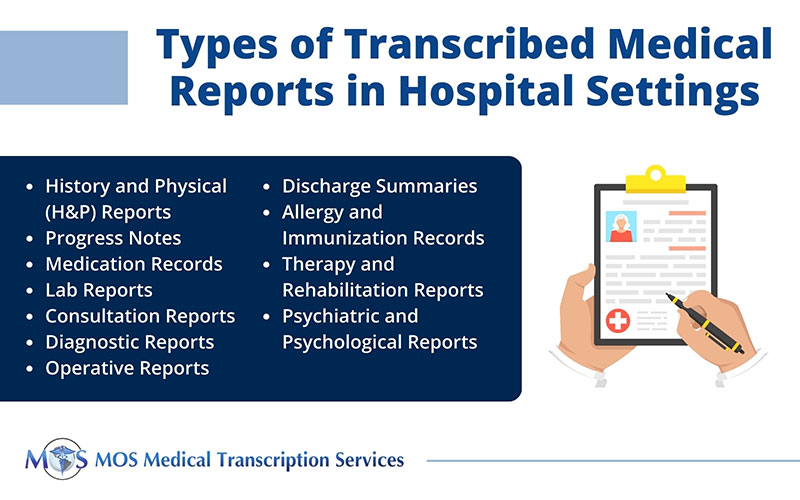
Table of Contents
Maintaining accurate and updated medical records is a key strategy to ensure that patients receive the best treatment possible. No matter how big or small a hospital, a medical record must be maintained for every patient evaluated or treated. Hospitals are increasingly relying on medical transcription services to convert physicians’ voice recordings into written reports. Experienced transcription companies provide HIPAA-compliant electronic health record (EH) integrated services for all specialties, making them a valuable partner for medical record management in the hospital setting.
Managing medical records is a challenging process due to implementation, regulatory compliance and legal considerations, data security and privacy requirements and retention and disposal policies. By helping hospitals create and maintain accurate and secure medical records, transcriptionists help protect healthcare providers from compliance issues while supporting delivery of quality patient care.
Transcription of a Wide Variety of Medical Record Reports
In the hospital setting, all medical records must be accurately written, promptly completed, properly filed and retained, and accessible. Medical transcription companies document different types of reports that make up the medical record:

- A complete medical history and physical exam that is documented no more than 30 days before or 24 hours after admission or registration. The history can include allergies, treatments, medical care, and present and past diagnosis. If it is accessible, a patient’s family’s medical history is often added to their medical record
- An updated examination of the patient, including any changes in the patient’s condition.
- Medication information – information on medicines the patient is taking is gathered from the patient or through prescriptions from other physicians already on file.
- Admitting diagnosis
- Results of all consultative evaluations of the patient and appropriate findings by clinical and other staff involved in the care of the patient.
- Lab results – This includes results related to cells, tissues, or body fluids as well as imaging reports such as x-ray and scans.
- Documentation of complications, hospital acquired infections, and unfavorable reactions to drugs and anesthesia.
- Operative reports containing specific details about a surgery the patient undergoes, include its procedure.
- All practitioners’ orders and nursing notes, vital signs and other information necessary to monitor the patient’s condition such as bowel and bladder functions, mental and physical condition of the patient, any sudden changes, and food intake
- Discharge summary with outcome of hospitalization, disposition of case, and provisions for follow-up care.
- Final diagnosis with completion of medical records within 30 days following discharge.
- Properly executed informed consent forms for procedures and treatments to require written patient consent.
- Financial information
All patient medical record entries must be legible, complete, dated, timed, and authenticated in written or electronic format.
How Medical Transcription Services help Streamline Medical Record Management
Managing medical records in a hospital setting is challenging as it involves multiple patients, including those with complex medical histories. Proper processes, technologies and support are necessary to keep track of every health record to ensure proper treatment and prevent potential patient care mishaps.
Partnering with a reliable transcription service can help hospitals ease these challenges with efficient patient record management.
Promotes accuracy and continuity
Accuracy in medical records is critical for proper diagnosis and treatment. A transcription mistake can be a costly one. For e.g., consider a patient who had knee surgery. The transcriptionist makes a mistake while documenting the surgeon’s dictation, leading to inaccuracies and omissions in the operative report. If the patient develops complications and requires further interventions, the erroneous medical record can lead to delays in determining the underlying cause of his ongoing symptoms and delays in treatment and appropriate management.
By transcribing physician dictation correctly, reliable transcriptionists can prevent inaccuracies in medical record information that can risk a patient’s health and overall well-being. The same applies for continuity. Experienced transcriptionists can ensure a seamless flow of information into medical records, enabling healthcare providers and their patients to make informed and timely decisions.
Facilitates efficient and convenient care
Proper and efficient medical record management can considerably reduce healthcare costs and improve patient satisfaction. It promotes convenient care with shorter waiting times and less paperwork. By supporting these goals, outsourced transcription services enable hospitals to focus more on improving patient outcomes instead of getting bogged down by endless documentation and administrative tasks.
Easy access to vital medical information
EHR/EMR integrated transcription solutions have transformed how providers create, access and store medical information. Instead of searching through a mountain of paper files, they can access specific records with just a few clicks. This also makes it easier to monitor and update patient information in real time.
Data availability in emergencies
In a situation that calls for immediate medical intervention, having easy access to vital medical information can significantly improve patient outcomes. By leveraging modern medical records management systems and medical transcription solutions, hospitals can easily retrieve medical records during emergencies and respond to life-threatening events promptly.
HIPAA compliance
Health Insurance Portability and Accountability Act (HIPAA) compliance is of paramount importance for any hospital. Medical records include insurance information, clinical laboratory test results, X-rays, clinical case notes, disease management program files, and documents on billing and payment. By ensuring compliance with this rule, a medical transcription company plays a key role in safeguarding the confidentiality, integrity, and availability of medical records. Adherence to HIPAA regulations ensures that sensitive electronic protected health information (ePHI) is handled securely during transcription, preventing unauthorized access, disclosure, or breaches.
By supporting efficient records management, a medical transcription service makes it easier for healthcare providers and facilities to access, retrieve, and update patient information. In addition, it allows for seamless sharing of patient information which improves care coordination among different healthcare professionals and departments across hospitals and other healthcare settings.


